-
Posts
1,334 -
Joined
-
Last visited
-
Days Won
94 -
Credits
5,463 [ Donate ]
Content Type
Profiles
Forums
Blogs
Downloads
Events
Store
Articles
Episodes
Transcripts
Gallery
Posts posted by Bob
-
-
Something in your math or data isn't adding up.
2500g = 5.51 pounds
1 lb of grain finished hamburger meat (70% lean) contains about 1250 calories.
A 16oz rib eye would have about 1220 calories (112g of protein and 85g of fat).
^ these are very similar.1220x5.51= 6722 calories, which is 2.4x greater than the 2800 kcal you are currently consuming.
So it actually works out this way: If you were to only eat ribeye or 70% lean burger or ribeyes, you would have to eat 2.24 lbs, or 1016g. This is actually very doable, as you eat one steak at lunch and another at dinner, fat and all.I eat twice a day. first meal may be 4 eggs fried in butter, with 4 sausage patties. This is around 960 calories. My second meal will be a 16-20 oz steak, which is around 1200-1500 calories. My daily caloric intake is 2200-2500, just a little shy of yours.
Hope that made sense.
-
-
I haven't used sauces in a long time since I went from Keto to Carnivore. But I was a fan of G. Hughes sugar free sauces...
https://www.ghughessugarfree.com/
I use Primal Kitchen avacado mayo as well because it's truly just avacado oil, unlike the supermarket brands that lie to you.
-
-
-
44 minutes ago, EczemaNoMore said:
yes have to adjust but I never had these issues really with carbs
Your microbiome is changing. The gut bacteria that used to feed on those carbs are going, "YO! Where's da sugar? Where's my fiber?". They will gradually decrease in number and the gut bacteria that loves the beef will increase in number.
I'll try to search more later. Currently a quick web search is just turning up results for anxiety after eating in general...
-
What was your diet before 5 days ago, before you started carnivore? How did you used to feel about eating saturated fats and fatty red meat? How do you feel about it now? Are you concerned about what others might think of your new diet?
I ask those questions because maybe you have "situational anxiety", a temporary anxiety that revolves around an event or scenario and usually passes once the situation resolves. Family, relationship, or friendship difficulties can cause situational anxiety. Most of us have been beaten with the message that meat and fat is bad for us and will give us a heart attack. Are you eating carnivore now, but in the back of your mind you are worrying if you are doing the right thing?
I still think that since you are only 5 days in, you are still in your adaptation stage and still have some transitioning to go. Your microbiome is going to change. Research suggests that disruption to your microbiome can contribute to symptoms of anxiety....
-
For starters, can you give a rundown on what your typical day of eating consists of, including beverages, seasonings, and supplements? I know you said strict carnivore, but I've seen various definitions of "strict". Do you take any medications?
I've broken through plateaus in various ways. Exercise, intermittent fasting, eliminating cheese, making sure not to eat too late, or changing up my macros.
If you're portion controlling and eating light/low calories, then yeah, your body might be in "conservation mode" thinking that there must be a famine or food shortage. If this is the case we just have to convince the body that there is food and make it ramp up metabolism.
-
I was out of town all day today, but when we came home we went out to eat, and I had this tasty dish...
It's actually a menu item called "Wayne’s Protein Overload Breakfast" at a restaurant called Mike's Place. The Italian sausage slices on the top left weren't part of the dish. My son had spaghetti and gave those to me.
I woke up 177.6 today, but tomorrow morning I will probably rebound a few pounds because I sat all day and then ate this kinda late.
-
Nice. My dad hunted, but didn't really pass it on to us kids. It is something I have said was on my bucket list, but I don't know if I will ever get around to it. I'm so spread out as it is.
I tried ground lamb a couple weeks ago. It was good. I need to try some more cuts, and more ruminant animals in general. I've also thought about buying a half cow all to ourselves.
-
Tell me how sold you are on the quality of this study.
Full Article: Harvard.edu
Here's is how the article starts off....
QuoteRed meat consumption associated with increased type 2 diabetes risk
Replacing red meat with plant-based protein sources may reduce risk of diabetes and provide environmental benefits
For immediate release: October 19, 2023
Boston, MA—People who eat just two servings of red meat per week may have an increased risk of developing type 2 diabetes compared to people who eat fewer servings, and the risk increases with greater consumption, according to a new study led by researchers from Harvard T.H. Chan School of Public Health. They also found that replacing red meat with healthy plant-based protein sources, such as nuts and legumes, or modest amounts of dairy foods, was associated with reduced risk of type 2 diabetes.
And here's a quote on how they gathered their data...
QuoteDiet was assessed with food frequency questionnaires every two to four years, for up to 36 years. During this time, more than 22,000 participants developed type 2 diabetes.
And somehow this data also produced these results....
QuoteIn addition to health benefits, swapping red meat for healthy plant protein sources would help reduce greenhouse gas emissions and climate change, and provide other environmental benefits, according to the researchers.
Attached to this post is the actual study. Here it is...
Download (must be logged in to download):
Red_meat_intake_and_risk_of_type_2_diabetes_in_cohort_study.pdfA couple things that caught my attention in that study were the following quotes....
"Red meat intakes were assessed with semiquantitative food frequency questionnaires."
"Processed red meats included... sandwiches; ... Unprocessed red meats included... a sandwich or mixed dish"
Questionnaires every 2 to 4 years? Can you remember what you ate over the last 2-4 years? And then sandwiches have bread which actually does increase diabetes risk.
And finally, in the results....
"In both females and males, those with higher total red meat intake had higher BMI and total energy intake, were less physically active, were more likely to be current smokers, and were less likely to use multivitamins."
So they were overweight, overate, sedentary, and more, but it's the red meat that was the problem?
I'm sure there is more to discuss, but I am tired.
-
Article Source: MSN.com
Record-Breaking Yosemite Climber Credits Strange Diet for Success
Story by Stacey Ritzen the-nose-el-capitan© Provided by Men's Journal
the-nose-el-capitan© Provided by Men's JournalEarlier this month, climber Nick Ehman broke the record for the fastest solo climb up the Nose, a steep, 3,000-foot route up the El Capitan vertical rock formation in California's Yosemite National Park. But in addition to his raw speed, the 28-year-old's fellow climbers were left stunned by his diet in preparing for the feat.
Ehman completed the climb in just four hours and 39 minutes, starting his climb at around 8 a.m. on Oct. 10 and scaling to the top of El Capitan by 12:41 p.m. He beat the previous record-holder, Alex Honnold, by over an hour. Honnold, who was featured in a 2018 Academy Award-winning National Geographic documentary about his quest to perform the first free-solo climb up El Capitan, previously made the climb in five hours and 50 minutes back in 2010.
To beat the record, Ehman had to cover a jaw-dropping eight-and-a-half vertical feet per minute.
In addition to being a member of Yosemite's search-and-rescue team, Ehman rock climbs in Yosemite about 200 days per year and has scaled the Nose dozens off times, including 16 times this year alone. However, while most climbers stick to high fiber diets consisting mostly of fresh vegetables, lean proteins, whole grains, and healthy fats; Ehman revealed his bizarre regimen to the ElCap Reports blog.
"His exceptional diet of meat, salt, and water seems to have given him unusual strength and endurance and he took no water or food on this run up the route," the publication writes. "Our local vegetarians were dumbfounded!"
Ehman told The San Francisco Chronicle that he knew he'd have a shot at the record when he made it up the first 300 feet of the Nose, "an intimidating mix of slick slab and incipient crack climbing," in just minutes that morning.
After cruising the first pitch in minutes that morning, he knew he’d have a shot at claiming the title of fastest person to solo aid climb the route.
"I didn’t know when I set up that morning how comfortable I’d be going fast," he explained, before falling into his groove. "I felt very comfortable in that no-fall headspace, and felt like I had to go for it."
El Capitan, which was once considered "forever impossible" to climb before advanced equipment made it possible in the 1950s, has since become the standard for big-wall climbing, attracting climbers from all over the world.
-
-
20 minutes ago, Qapla said:
I will have to admit, when I hear the term "lion diet" I always think of having to eat all the meat raw ... after all, lions do not cook their food.
The Lion Diet is a term coined by Mikhaila Peterson, daughter of Jordan Peterson. It's the ultimate elimination diet, where you only eat ruminant animals (beef, elk, lamb, etc) with salt and only drink water. She had to get that strict in order to cure/reverse/stop several of her chronic autoimmune conditions.
There are some carnivores into the raw meat thing. That's a no-thank-you from me though, lol.
-
51 minutes ago, EczemaNoMore said:
Yes I’m fine now
Good. I'm glad to hear it.
51 minutes ago, EczemaNoMore said:I hope this will improve as I continue on carnivore.
Yes, it should. You can always back up to keto/ketvore and gradually increase your meat consumption and decrease your veggie consumption to help you ease into it.
53 minutes ago, EczemaNoMore said:Also often get anxious after I eat meat which is weird.
You're probably worried about stomach or sternum pain, which is understandable. I don't know how many meals a day you are eating, but you could also try reducing your portion sizes and adding a meal, so that you are still consuming the same amount of food just more spread out.
-
Welcome Frank. Are you okay now?
For possible non diet related possibilities, look over this list here... https://www.healthline.com/health/sternum-pain
The last one is a doozy, so if you also are experiencing any of the following, you may want to seek medical care.
- Pain or discomfort in your upper body, including your arms, shoulder, and jaw.
- Shortness of breath, trouble breathing.
- Fatigue.
- Lightheadedness or dizziness.
- Racing heart.
- Significant cold sweat.
- Chest tightness.
- Nausea.
You be the judge. I certainly don't want to scare you or give you anxiety, but I would hate to blow this off as nothing if it were actually serious.
Now if it is diet related, some thoughts that come to mind are...
1) Your stomach PH levels need to adjust because you were previously eating a bunch of fatty meat.
2) Gerd, acid reflux
3) Gallbladder, Bile Production. Your gall bladder stores bile produced by the liver to assist with fat digestion. If you are not used to eating a bunch of fatty meat, this organ needs to wake up and ramp up its bile storage and output.
It's normal to have digestive issues for the first month as you adapt to this new way of eating. Your body learns to produce more bile. The microbiome changes, etc.
I see that you posted this yesterday. I didn't have a chance to get online yesterday. So I am curious how long did the pain last? And are you okay now?
-
Nice! Do you get the lambs from a local farm?
And would I be right in assuming you like to go hunting?
-
9 hours ago, Geezy said:
Salmon and cheese four egg omelet.
Looks saucy. And do I spy a little hot sauce in there?

I'm trying to make a return to intermittent fasting during the week. I was stuck inside doing business/office stuff in the morning, so I had my eggs and turkey sausage around 11:30am. Then left the house and worked. When I returned home I joined the Zoom call with Dr. Ken Berry MD. And when that was over I had a pound of ground beef at around 8:30 pm.
I woke up 179.2 this morning!

Today is fasting day, either eating at dinner for a 24-hour stint or skipping the day altogether.
-
-
-
After my doctors visit I had 4 turkey sausages and 3 eggs. For dinner I had upwards of a pound of ground beef and 3 chicken breast tenderloins.
None of it was very photogenic, lol.
I wonder how @ol_hilly is doing
-
And again, it may not even be a problem. Those milk carbs could be trivial, especially if you're working out. The fat:protein in the milk is 1:1 so modifying that won't change your ratio much.
-
10 hours ago, Geezy said:
if I’m ever in the hospital again that she’s going to be kept busy bringing me food to eat because I’m not eating the “heart healthy” food they try to shove on us
Ironically, I started my carnivore journey in the hospital when I broke my ankle. They actually showed me a menu and I was able to order sausage, bacon, and eggs. I was in recovery post-op, and that was day 1 for me

-
10 hours ago, Coldstomp said:
What would you recommend anything to get it back to 1:1?
I do think what you are currently doing is fine. I initially just used the protein number you gave me, but here is how the math works out using the links and clarifications you provided.
Fat 184, Protein 174. This is almost 1:1 gram for gram.
Fat calories 1656, Protein calories 696. This is 2.75 to 1 calorically speaking.I don't see many ways to change it. You could reduce butter, as it's all fat, and cut your beef in half and add another salmon patty. But I don't think you need to do any of this.
I'm thinking your milk has carbs (lactose sugar) in it. If you're losing weight don't worry about it. If you stall out then maybe nix this. But if you are drinking it in the morning then you have all day to burn it off and it might not be affecting you any.

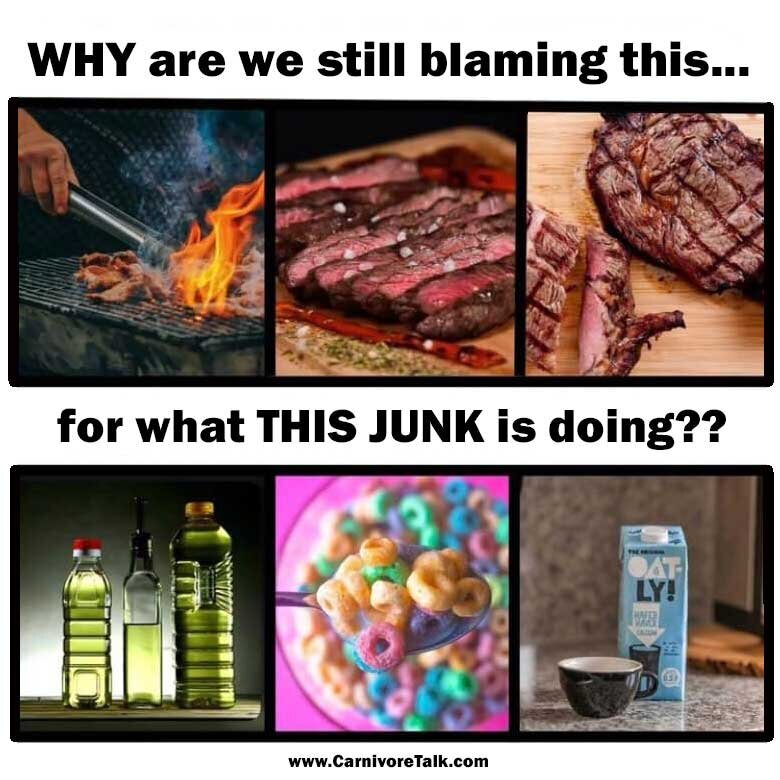

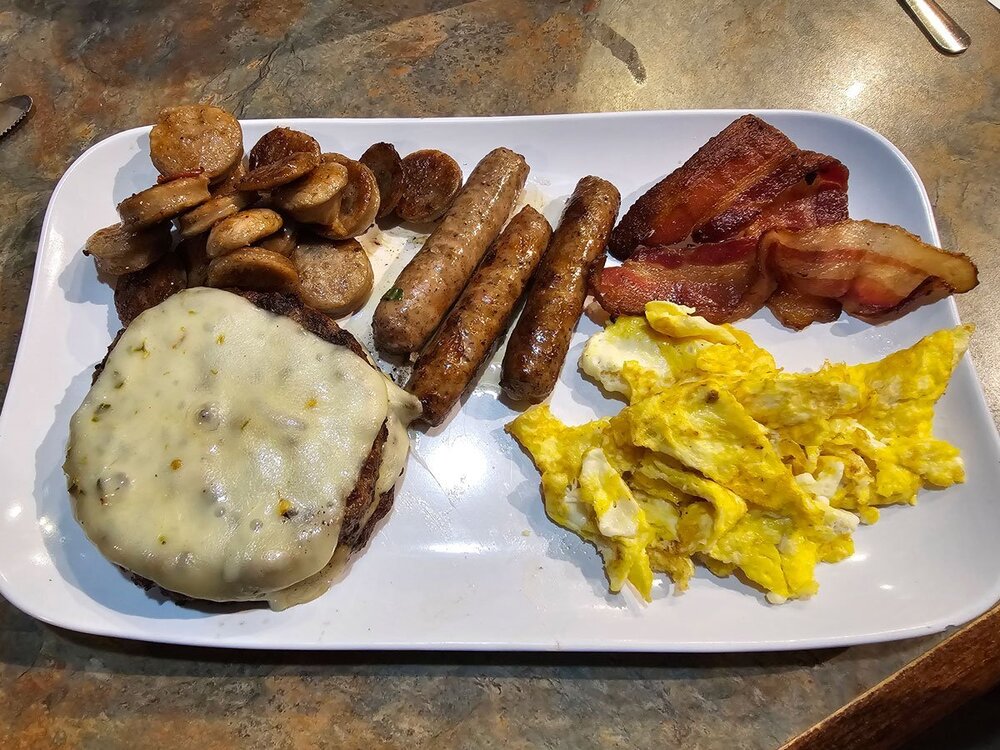

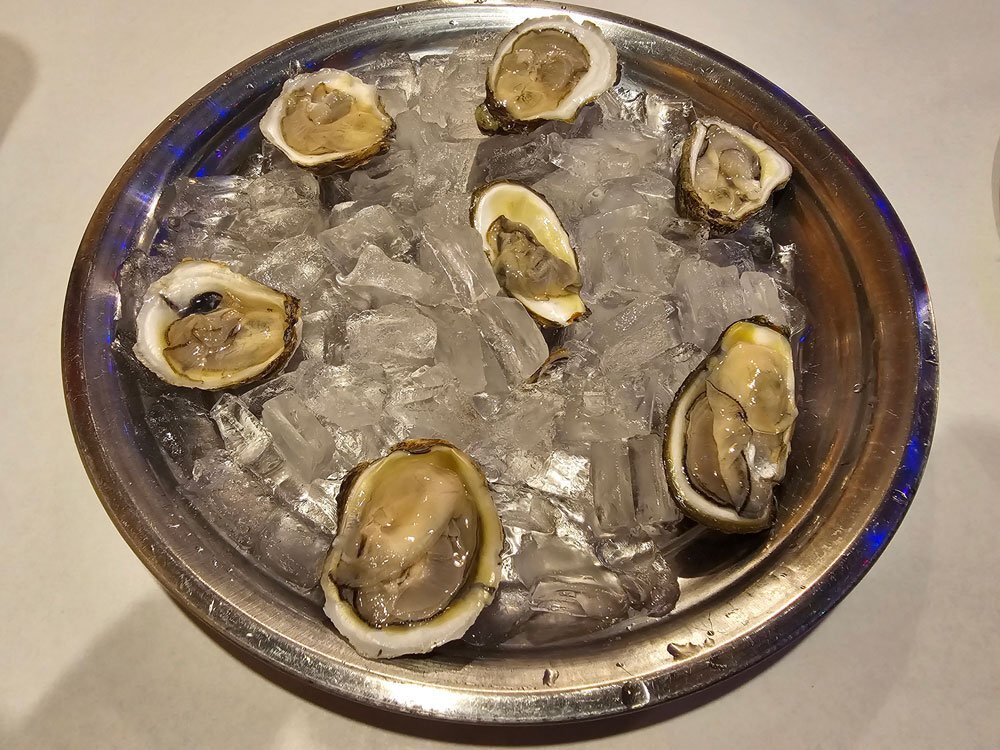
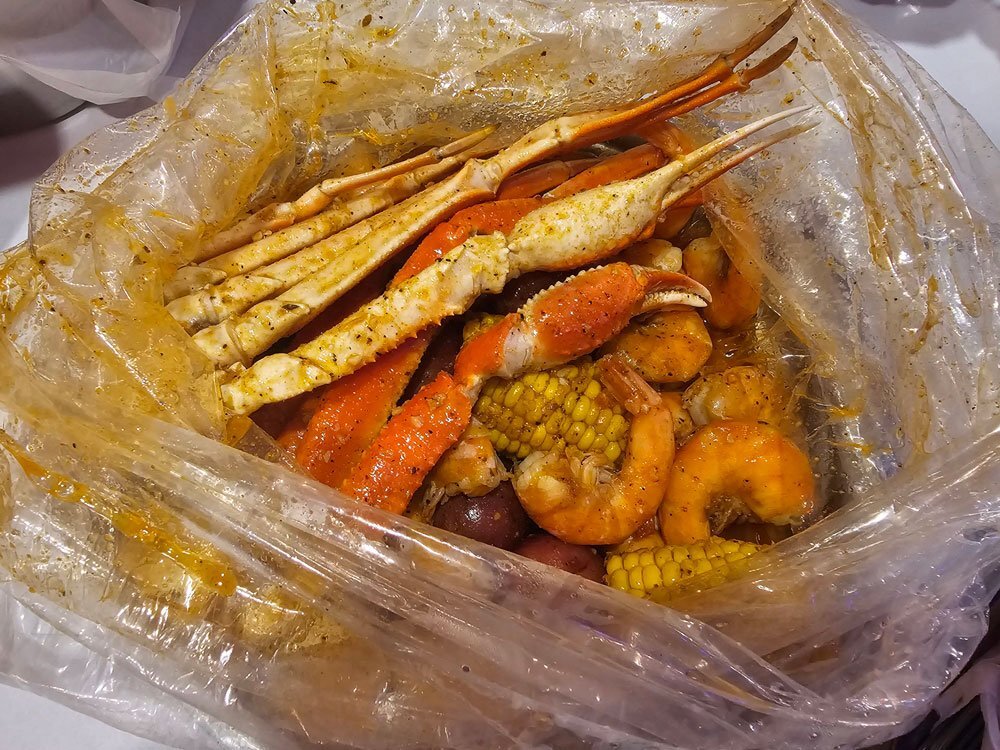
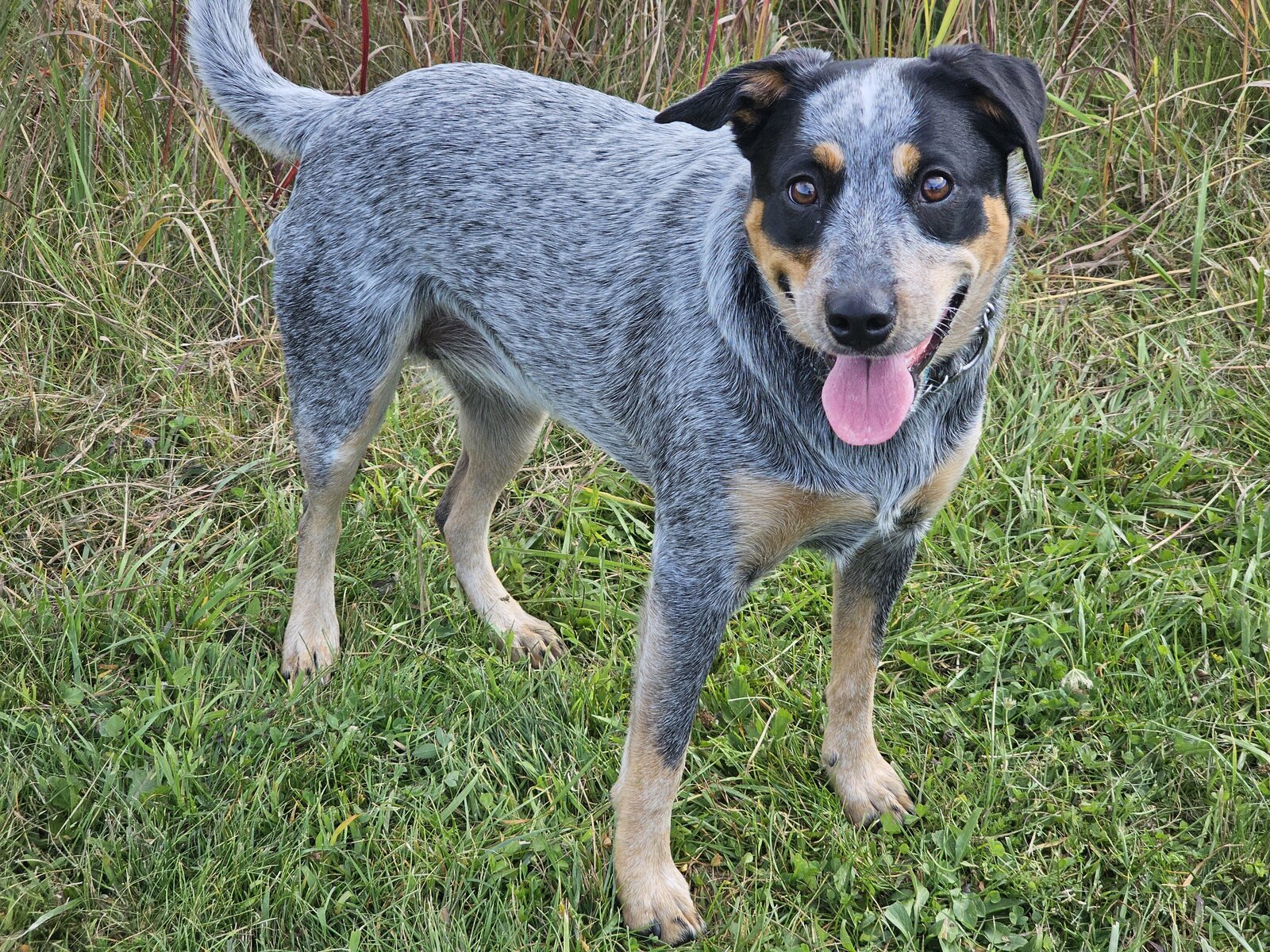
What's fer supper!
in Everyday Chit Chat & Off-topic Discussion
Posted
Intermittent fasting, so no breakfast.
Lunch was beef sticks, pork rinds, gouda and havarti cheese, and sardines.
I had a NY Strip for dinner, and prepared it a new way. Instead of grilling, which I usually do, I preheat the oven on HI/Broil and also heated up a skillet on the stove. I seared one side of the steak for 4 minutes and then flipped it and put the whole skillet on the top shelf of the oven and left it in there for 6 minutes. This made a lot of the fat melt, which I poured into a dish and used as dipping sauce. The fat that stuck to the steak was crispy and easy to eat.